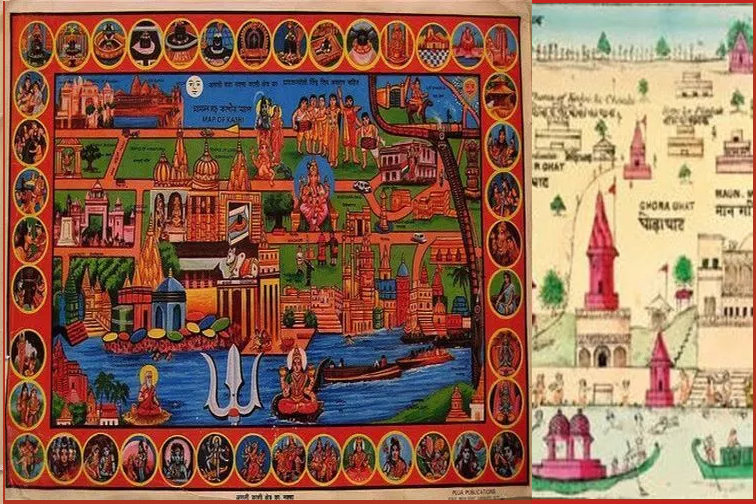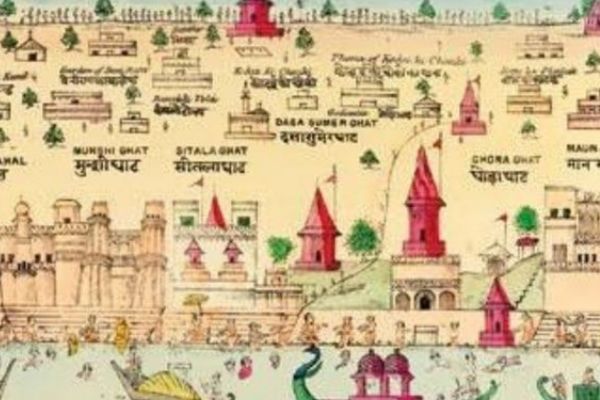Indica’s Yatra conference will focus on how India has been explored in the past, while also looking at new trends in travel and tourism.
There are many ways of knowing India. Unraveling her layers through yatra has been the most primordial way of getting closer to her core. The idea of Bharat is understanding a unique culture that celebrates diversity. While the philosophy and symbolism are the same, the practices and expressions are extremely varied and ever-changing.
Indica Yatra conference will focus on how India has been explored in the past, while also looking at new trends in travel and tourism. Taking our cue from the past, we invite scholars to present the Indic traditions of yatra as spelled out in our scriptures and literature to build a repository of valuable yatras – both the lost and the thriving.
With a renewed understanding, we want to take inspiration from these traditions to design ‘Experiential Tourism’ products and services for contemporary travelers. We invite ‘Storytellers’ of all hues — travel agents, tour operators, curators, guides, digital platforms, and event management companies — to share with us their success stories as well as ideas for developing India’s Experiential Tourism.
Call For Presentations From Storytellers
Over the last few years travelers have begun to seek authentic, immersive and transformative experiences by engaging with the history, people, culture, food, and environment of the countries they visit in a more meaningful and engaging manner. This has given rise to a new genre — ‘Experiential Tourism’ (ET).
ET is now recognized as the fastest-growing segment within the global travel industry. Our conference will focus on tapping the potential of Experiential Tourism in India. By delving into our past, a thriving future based on tourism is envisioned.
We are inviting presentations from Storytellers who seek to develop new ideas, services, and experiences based on our heritage. These could be either case studies or presentation of an idea that can be developed as a viable tourism product.
Some specific areas where we are looking for presentations at Yatra Conference are:
Case studies of innovations
We invite presentations on pilot/start-up projects that have opened up new markets, destinations or segment of tourists. Ideas that have worked or have the potential to transform how people travel are welcome.
Newer routes & experiences
Curated travel based on the trails of great personalities like Guru Nanak, Swami Vivekananda, Mira Bai or Adi Shankaracharya helps to throw light on the spread of philosophies, tenets, and ideas across time and regions.
Experiential tourism covers not just tangible history and culture but also food, craft, environment, and wellness. In a world where most experiences are artificially curated, many travelers yearn for experiences that are indigenous and authentic.
How can we create broader experiences that include the above areas? What are the untapped opportunities that are waiting to be explored? What are the potential destinations or circuits that can bring a whole new set of tourists to India? How do we reach out to countries that do not have India at the top of their wishlist? How we can highlight the lesser-known destinations in India?
New careers in Experiential Tourism
Experiential Tourism requires new skill sets and knowledge base. People who are deeply passionate about our history and heritage need to be identified, trained and encouraged to embark upon careers as curators.
Aggregator platforms need to be established enabling smaller enterprises, operators, and individuals to offer their services. A start-up ecosystem needs to be nurtured such that more jobs and enterprises centered around Experiential Tourism are created. This requires interventions at the policy level as well as through private participation and enterprise.
Call For Papers From Scholars
Given below are some of the indicative themes on which we are inviting papers.
In the Indic tradition, yatras were undertaken in two major forms:
- Sacral (Teertha Yatra): These are undertaken for reasons such as obtaining Punya (supernatural reward), Papavimochana (the undoing of the supernatural effect of wrong-doing), Prayashchitta (penance out of remorse or repentance), Parivrajana (the one done as part of ascetic life for the practice of detachment, etc.)
- Worldly (des’aatana): These are undertaken for reasons such as Ullaasa (pleasure), Kautuka (curiosity), Lokadhyayana (studying the world and society), Vartaka (trade), des’aatanajeevika (as part of an itinerant occupational lifestyle), etc.
Ancient, medieval and premodern scriptures and literature in Sanskrit, Tamil and other Indian languages cover these aspects of yatra in the form of narrative representation, in the form of Sthalapuranas (legends of sacred places known for the sacral power of a water body or a land form such as a cave, hill or a temple) or even the descriptions of imaginary aerial tour of places and landscapes. For instance, the Mahabharata has the narrative description of a tour of penance by Arjuna.
We invite papers on these and other similar Indic ideas of Yatras as reflected in our scriptures and literature
The Sthalapuranas are repositories of culture, providing an overarching philosophy with roots in local traditions. Sthalapuranas are an important genre of premodern Sanskrit and other Indian literature. A large number of Sthalapuranas have been included as part of maha (major) Puranas and upa (minor) Puranas; among them, Skanda Purana has the largest collection of such narratives. Many of the Sthalapuranas were in the form of oral literature.
We invite research papers with literary, critical, historical, anthropological and other analytical studies of Sthalapuranas with a specific focus on the relationship between these narratives and the Indic Yatra traditions
Also connected to Yatras are the Sandesha Kaavyas (messages in the form of poetry) or the Doota Kaavyas (an envoy’s message in the form of poetry), in Sanskrit and other Indian language literature. The origin, inspiration, and prototype of this genre is Kalidasa’s brilliant poem, Megha Sandesham (Megha means cloud), also known as Megha Dootam.
Under the guise of a romantic narrative of a cursed Yaksha (supernatural being) in northern India sending a message to his beloved in Southern India through a cloud, the poem has a description of an imaginary aerial tour from the north to the south provided as a guide to the messenger, the cloud. A number of Doota Kaavyas were composed in this model in Sanskrit and other Indian languages, each covering a different aerial route.
The motivations and background for these fanciful aerial travel imaginations in our literature make a very good topic for not just a literary but even a historical and cultural inquiry.
We invite research papers on this topic for the Yatra Conference
India has attracted foreign tourists since ancient times as attested in the writings of Megasthenes, Marco Palo, Faxian, Abu Abdullah/lbn Batuta, Nicolo de Conti, Abdur Razzaq, etc. Indica of Megasthenes is reconstructed from later Greek works. Marco Polo’s ‘Book of the Marvels of the World’ and Faxian’s ‘Record of Buddhistic Kingdoms’ are considered valuable historical documents.
Very little work has been done looking at these works from the point of view of ancient foreign tourism in India. Viewing these and other foreign texts to understand the motivation, modes, and patterns of foreign tourism in ancient India may yield new insights on how India can continue to attract the world to herself.
We invite papers from scholars on ancient texts covering foreign tourism in ancient India
Meticulously written travelogues were a part of many a foreigner’s visits to India. While European travelogues on modern India are interesting in themselves, travelogues written in various Indian languages inspired by European travelogues form an important area of research from a literary, critical, historical and anthropological perspective.
In the early stages of transition from a traditional to modern society, Teertha Yatras began to get documented. Emotional poetic expressions of a travel experience made the authors resort to classical modes of expression but in a modern style. Women travelogue writers emerged. The traditional response to new modes of transport was documented.
We invite scholars to present papers on this genre of Indian literature from different Indian languages
The above themes are only indicative. We invite academic papers on these and many other such tours and travel-related topics in the premodern literary works in Sanskrit and other Indian languages.
Important Dates for Yatra Conference
Submission of Abstract – 25 August 2019
Final Paper/Presentation Submission – 5th October 2019
Curators – Dr. Nagaraj Paturi and Anuradha Goyal
Conference Dates – 15th, 16th, & 17th November 2019
Conference Venue – Varanasi
Contact email – yatra@indica.org.in
Please mark in the subject if you are submitting as a Scholar or Storyteller.
Please reach out to us for any form of collaboration in organizing and promoting this Yatra Conference event.














Excellent idea– all the best with the conference!
Thank you, Aditya. Do we see you at the conference?
Unfortunately not– terribly busy until Feb. Otherwise I’ve never been to Varanasi, and the conference would’ve been a fabulous backdrop for exploring the ancient city.
Most innovative idea . This fest needs more outreach if the message has to reach artistes and scholars.
Indumati ji – we intend to bring scholars and storytellers together on a platform.
Good idea to know unique culture and diversity of India.
Was eagerly waiting for the dates. Now it has been confirmed, can’t wait for it..!????
Blog is damm amazing as usual..!!????
This is wonderful idea – if my dates work out would be a delight to be there during the dialogues and exchange
All the best for this though
Would it be only in English or any of the Indian Languages…please let me get to know…!!!
Lakshmi – we will prefer English but request you to drop an email & we will respond.
yes, count me in as a storyteller. i generally attend conferences as a moderator, sessions chairman, etc.having travelled almost the country including the siacen, kargil and closely observed the lifestyles of different states of our country i can do justice in this aspect.
Dr. Karthik – please send us an abstract on the above-mentioned email address.
Hello Ms.Goyal
I have few queries? Where should I mail the queries?
Thank You.
Chinar Ji, please write to us at yatra@indica.org.in
This is a great idea of bringing India’s diversity to one Yatra. Unique diversity is that which makes India a special country. Would really love to be part of this Yatra. I thank #TemsutulaImsong for sharing this information.
Thank you, Shri Paul. We would be happy to see you at the conference.
As a tourism research scholar, I will definitely take participate in the conference. Also, motivate fellow scholars and students for the same.
How can we connect for further correspondence?
Regards
Ankit Agrawal
Research Scholar
Jiwaji University
Assistant Professor
Aditya College,
Gwalior
Ankit, please share this Call for Papers with anyone you think may be interested. Please write to us on the email mentioned above.
Hello, I wanted to present a paper too, but I see that the date is past now, in case it is extended please do let me know if I can still send my proposal. Thanks
Most innovative idea . This fest needs more outreach if the message has to reach artistes and scholars.
bollywood news channel
The apt word for Curiosity is Kutuhal and not Kautuka; Kautuka means appreciation. This might need correction.
The idea is great, would look forward to reading published papers.
Not a bad idea, your writing is very good.
I appreciate your hard work to collect this information and sharing with us.
very helpful sharing contain.
information is very powerful.
No words about this, Just awesome
Great blog. Thanks for sharing.
Well done, excellent informative blog about Indian travel and tourism.
I read your writings all the time. Your writings are very beautiful. I like them very much. Thank you very much for sharing your tips.